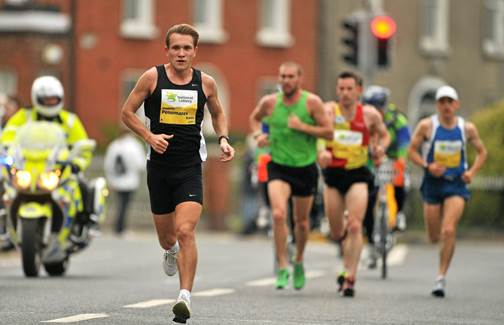The 12 commandments every marathon
runner should follow, from 26.2-guru Steve S.
When I did my first marathon in 1976, the
event was thought to be for experienced club runners aiming to break three
hours. Thirty-six years on, well over a million people of all speeds, shapes
and sizes have run a marathon, and the event has become much more accessible.
It's a very honest sport: put the work in and you usually get the rewards. And
if you don't, there is usually a good reason for it. Here are the 12 golden
rules that i have learnt in three and a half decades of marathon running.
1.
Build up to it If you want to run a successful marathon, don't rush into it. Start
with shorter events, gain experience and build endurance, then tackle a
marathon when you get fitter and stronger. Paula Radcliffe and Haile
Gebrselassie had been running for well over 10 years before attempting their
first marathon. I regret running my first marathon aged just 18. I trained well
for a few months after leaving school but wasn't ready, started too fast and
much of the last 10K was walked. I ran 2:54:42, but was capable of quicker.

If you want to run a successful marathon, don't rush into it
2.
Long runs are key Whether you want to run sub-3:00 or sub-5:00 for the marathon, the
key session is the weekly long run. The more you do, the better your endurance.
Other runs – speed work, midweek distance runs and marathon pace runs have
their place but they're bot as crucial. The key to a good marathon is how well
you hold your pace in the last 10K and that ability comes from doing plenty of
long runs. In recent years, I have tried to do about six long runs of around 20
miles across the 15 weeks before the marathon. That gives me the confidence I
need to know I can hold a pace over the second half, when the going starts
getting tough.
3.
Be consistent, be sensible Consistent training (for example, 15 weeks at 40 or 50 miles a week)
is better than five weeks at 100, then five weeks off through injury. However,
it is best to miss a few days if you aren't feeling well or have an injury,
rather than run through it and make yourself feel worse. A lot of runners lose
sight of the fact that rest is a vital component in any schedule, yes, there
has to be some training in which you get used to running while tired, but do
this too often and you could break down.
4.
Race other distances Races are more fun than training and you can practice pacing,
hydration and running in crowds. I'd suggest running a half marathon. 10K or
10-miler once a month to monitor your progress. The merits of a 20-mile race
are more debatable. It's probably fine for a marathon-pace run, scheduled four
to six weeks before the marathon, but a flat-out 20-mile race will probably
take more away from your marathon than it will enhance it. In my 30s, I ran
some very good 20-mile races in March but never got near that pace when I did the
marathon a month later.

Run
10K or 10-miler once a month to monitor your progress
5.
Don't skimp on speed On the face of it, 26.2 miles doesn't seem to require a great deal
of speed endurance is the key. However, there is a link between your 10K
ability and what marathon time you can run. A sub-3:00 marathoner, for example,
needs to be able to be able to run around 40 minutes for 10K. A sub-3:00
marathon translates as 43:40 for each 10K segment, and if you are going to put
four of those back-to-back then you're not going to be comfortable if 41
minutes is near your limit.
6.
Get treatment Sometimes
a small niggle can become a serious injury. Getting it sorted quickly before an
injury develops could save a lot of frustration. A good sports therapist will
be able to spot a problem before it prevents you from training, so booking in
for regular massages is worthwhile. It's only regular visits to the osteopath,
physio and sports therapist, together with more stretching, core and weights
work that has kept me training and bale to race regularly.
7.
Train smarter as you age As you get older, speed decreases, stride length shortens, recovery
takes longer and injuries increase. For my first 30 years of marathoning, I
stayed fairly healthy despite sometimes doing crazy things like running a pair
of sub-3:00 marathons in a week, twice in the same year. But if I'd carried on
doing that, I have no doubt I wouldn't be running respectable times in my 50s.
I now focus on one marathon a year, give my body a rest from long runs during
the summer and work more on speed. I don't train as hard as I used to, but I
train smarter: resting more, staying off road where I can and doing speed work
on grass. Consequently I have been able to stay at pretty much the same level
from my 30s to my early 50s.

I
don't train as hard as I used to, but I train smarter: resting more, staying
off road where I can and doing speed work on grass
8.
Fuel your efforts Good nutrition and hydration can make a huge difference, both in
training and in racing. The biggest change in my marathons over the last 10
years or so is my use of gels. I regularly used to run out of energy in the
last six miles but since using gels, I have been far stronger over the closing
miles. I usually find four is sufficient for my needs in the marathon.
9.
Have a target It
is important to have a target to keep you motivated. Early on, it helped me
telling others what time I was aiming for to increase my drive. But in later
years the motivation has been to do well in my age group, or to help others.
Two years ago i ran with someone doing their first marathon, while last year,
on limited training, my goal was to extend my sub-3:00 streak to over 35 years.
10. Be realistic It helps to know what time
you are capable of in a marathon and then adjust your pace to that time. Until
you have the experience of knowing how your body will react past 20 miles in a
race situation it is best initially to err on the side of caution. Before you
run a marathon, you should know fairly well what pace you will attempt based on
your training, past races, recent injuries, weather conditions, the course
profile and even your age.

The
most important thing after a marathon is to rest and recover
11. Pace sensibly Many marathon runners do
everything perfectly in training and then blow it during the race by suddenly
deciding they feel great and attempt a pace they have never raced at before.
Invariably this leads to a good first half followed by a painful second half
and a time much slower than you are capable of. I used to blast out in
marathons and hand on, but I paced my sub-2:30 PB more sensibly and in later
years my key has been to conserve as much energy as possible over the first 20
miles, so I'm at my freshest for the crucial last 10K.
12. Recover and review The most important
thing after a marathon is to rest and recover. However the race has gone, take
some positives from it and congratulate yourself on the achievement. At some
point, analyze what went right and wrong in training and the race itself so you
can make adjustments for next time. And don't return to hard racing too soon.
The body may seem to have recovered but a speed session or short race can show
otherwise - as I have found to my cost in recent years. Recharge both your
batteries and motivation for your next challenge.